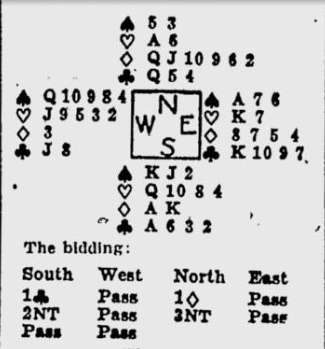St. Petersburg Times – 26 May 1935
There is probably no game which has so loose and incorrect a terminology as bridge. One reason for this incorrect use of the technical terms peculiar to the game is that so many of them have been stolen outright from contract’s great ancestor, whist, and that modern writers on bridge have been prone to accept the words used by whist writers to describe positions which appear to be similar, but which, because of the basic difference in the game, actually are not the same at all.
As an example, the Deschapelles coup, a play named in the days of whist for the ‘great French whist player, Guillaume let Breton Deschapelles, is frequently misused. As designed by Deschapelles and used by thousands of whist players since his day, the play is a sacrifice of a high honor in the hand of one player in order to create an entry in the hand of partner—in other words, an entry-making play. An understanding of this play was essential in whist and is equally so in contract.
There is, however, another play, equally fine, which many writers have incorrectly described as a Deschapelles coup. This play is the direct opposite of the Deschapelles coup, and has for its purpose the removal of a card of entry from a hand, usually the dummy, to prevent the bringing in of a long suit.
REMOVING AN ENTRY
East’s sacrifice to destroy an entry in the dummy early in the play brought about the defeat of the contract in the following hand:
South Dealer Both Sides Vulnerable

The Play
West opened the ten of spades, which East captured with the Ace. Before blindly returning his partner’s lead, he carefully studied the dummy. Evidently, declarer, by his bid, was well protected in spades, probably holding the King-Jack. He must also have either the Ace or King of diamonds or both. That left but three cards in the diamond suit outstanding. If South held them all, the contract of three notrump could not he beaten, regardless of East’s return.
If, however, South held the Ace-King alone, the diamond suit could not be brought into play if the heart Ace in dummy, the only entry card, were removed before East had a chance to play them. Taking all this into consideration, East led his king of hearts as a sacrifice, and declarer, knowing East would continue the hearts, had no way of escape. With dummy’s sole entry removed, South was limited to two tricks instead of six in diamonds and could not fulfill the contract. While this was not a Deschapelles Coup, it was an effective entry-removing play.


